Your frying pan is crying out for scrambled eggs and omelets…
The egg cartons are empty, and the only place you see those brown-shelled eggs is in your dreams…
Winter is a rough time of year for a chicken owner.
Shorter days equals fewer eggs, and you watch the dollar bills fly out of your wallet to pay the feed bills, with little to show for it.
So what’s an egg loving homesteader to do?
Why Chickens Stop Laying in Winter
There are a couple of different reasons you should count on seeing fewer eggs in the nesting boxes come winter:
1. Decreased daylight — The reproductive cycle of a chicken is stimulated by light, and chickens need 14-16 hours of light each day to maintain peak egg production. In some locations during the winter months, you might only see nine hours of light each day, which signals to the chicken’s system to cease production of those gorgeous orange-yolked eggs.
2. Molting — Each year, a chicken undergoes a process of losing feathers and growing new ones. This is the molt. Generally, chickens will molt in the fall or early winter, although it can greatly vary from flock to flock. As you can imagine, it’s a pretty big deal to grow a new set of feathers, (feathers are made of almost pure protein), so it totally makes sense why a chicken would stop laying during the molting period. Their body needs to spend its resources on feather production, not egg production.
3. Temperature Changes — While drastic drops in temperature may play a small role in decreased egg production, I’m going to venture to say that the other two factors are the biggest players here. Nevertheless, don’t be surprised if a heavy-duty cold snap throw your flock into an eggless state as well.
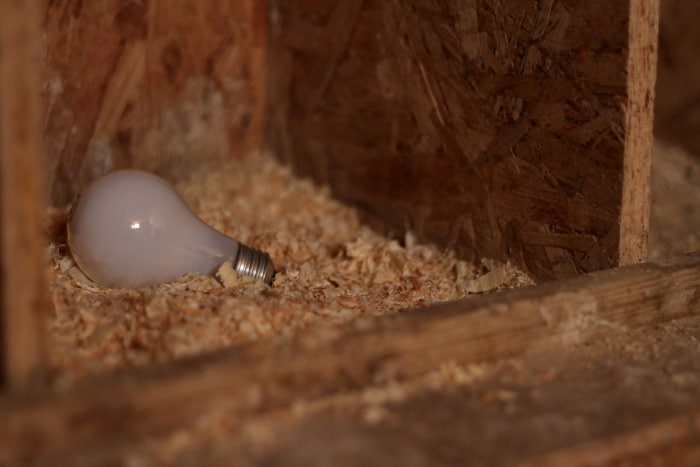
Two Ways to Increase Egg Production in the Winter
1. Forced molting — (Note: I don’t recommend this, but felt it needed to be mentioned anyway…) Molting is a bit of an issue for commercial poultry operations, as it’s really not profitable to have non-laying birds sitting around for a portion of the year. Industrial flocksters have come up with ways to control or force a molt by withholding feed or feeding drugs or hormones. However, this is a practice I have no plan of incorporating on my homestead, so don’t expect to see tutorials any time soon. 😉
2. Increased lighting — Although still an artificial method, providing supplemental lighting in the chicken coop is a slightly kinder way to maintain egg production, without the severity of forced molting. However, there is definitely a method you’ll want to follow if you decide to use artificial lighting for your birds.
The Dos and Don’ts of Supplemental Lighting in the Chicken Coop
- DO wait until your chickens are at least 20 weeks of age before introducing any artificial lighting plans.
- DO use a regular 25 watt or 40 watt bulb, hung in a place far away from feathers and bedding.
- DON’T make a sudden switch (i.e. going from zero supplemental lighting, to an extra five hours every day)
- DO gradually increase your lighting over a period of time. Many experts suggest increasing in increments of 30-60 minutes each week.
- DO shoot for 14-16 hours of light each day, for best results. Anything less than 14 hours will mean fewer eggs. Anything more than around 16-17 hours may stress out the birds and cause them stop laying altogether.
- DON’T add the extra hours at night. Opt for the early morning hours instead, as plunging them into darkness when the bulb shuts off at night can be an unnecessary stress.
- DO use a timer so you stay super consistent with your lighting efforts.
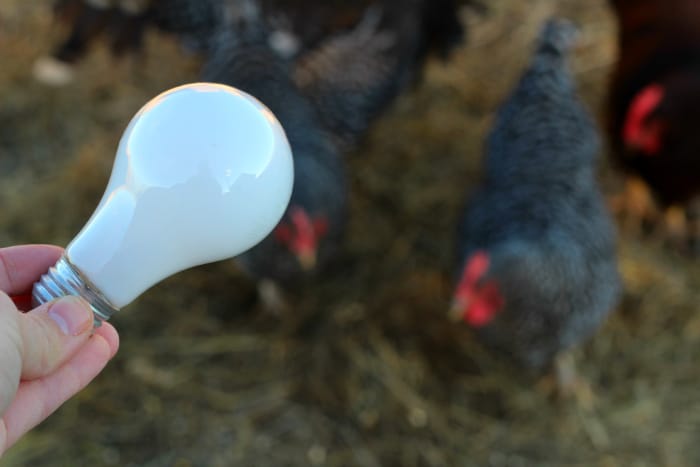
So You CAN Use Lights, But Should You?
Believe it or not, there is considerable debate surrounding the topic of artificial lighting in chicken coops…
Pros of Supplemental Coop Lighting
- EGGS! (need I say more?)
- You’re getting something in return for feeding your flock alll winter long.
Cons of Supplemental Coop Lighting
- You have to deal with the hassle of setting up a timer, or turning lights on/off
- There’s a potential fire hazard of keeping a light bulb on unattended in the coop (this is the #1 reason I do not use heat lamps in my coop…)
- Forcing hens to lay with supplemental light prevents them from following their natural reproductive rhythm and some chicken advocates argue it is hard on the birds and causes them to “wear out” faster.
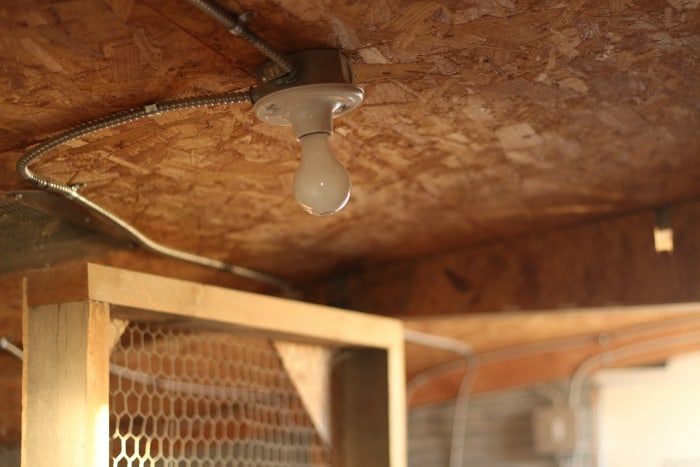
My Conclusion…
After hemming and hawing about supplemental lighting in the chicken coop for several years, I’ve finally decided to embrace eggs as a seasonal food. This is an obvious concept when you’re growing fruits and vegetables, but can be harder to grasp when it comes to other food products, as we are accustomed to having them available 24/7 at the grocery store.
As we’ve amped up our personal food production efforts, it’s become increasingly clear to me that milk and eggs are just as seasonal as corn and beans. It’s OK to have times of the year when we don’t eat scrambled eggs 4x per week.
Therefore, we currently don’t use any supplemental lighting in our coop. It simplifies chicken keeping for us, and I feel good about giving my hens their natural break. Sometimes I still get a few eggs per week, other times I get none, but I adjust my cooking as needed and we always survive until laying picks up in the spring.
If you’re still struggling a bit at the thought of being eggless, here are a few strategies to soften the blow:
- Eat fewer eggs: This one is obvious, but I’ve found we really can survive on fewer eggs for a portion of the year, and nothing terrible happens. And then of course, we glut on omelets, custards, crepes, and fried eggs when the hens are laying heavily. It’s a happy trade-off.
- Preserve eggs during peak production times: As some of you know, my past efforts with preserving eggs have been a little rocky, but it’s definitely doable. Just in case you’re interested, here is my tutorial on how to freeze eggs, and here are my misadventures with dehydrating eggs (hopefully you have better luck than I did!)
- Buy from the neighbors: Every so often, a neighbor’s flock will continue to lay like crazy during the winter, and I’m happy to buy or barter eggs from them.
- Get creative with your feed bill — If it totally makes you cringe to be pouring the feed to your flock, even though you are eggless, check out this big ol’ list of ways to save money on your chicken feed bill.
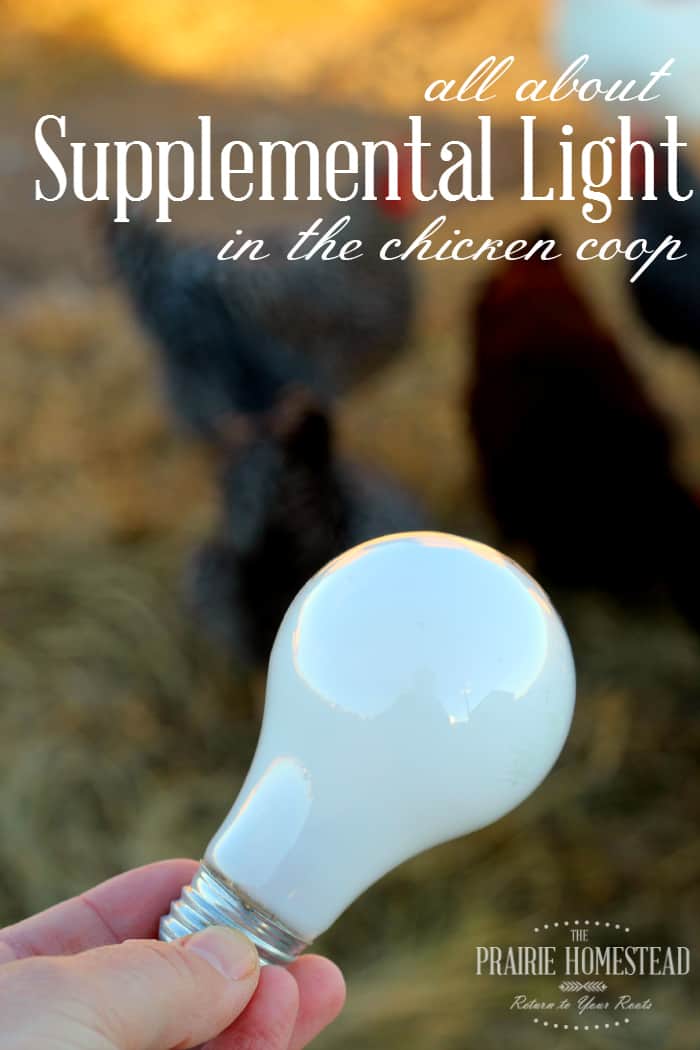
Do you use supplemental light in your chicken coop?
Other Posts from the Coop:
- Safety Hazards of Heat Lamps in the Chicken Coop
- 15 Ways to Save Money on Chicken Feed
- 30+ Ways to Use Eggshells
- How to Easily Peel Farm Fresh Eggs
- How to Build a Chicken Run
- Chicken Coop Guide
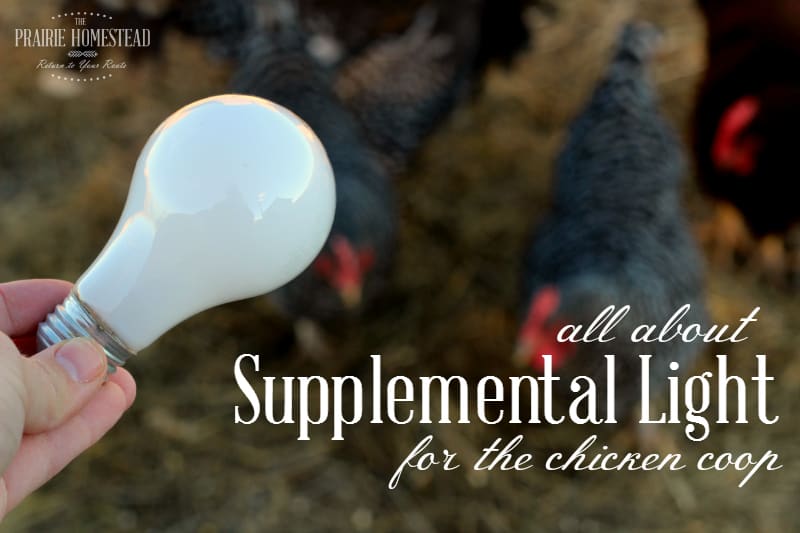

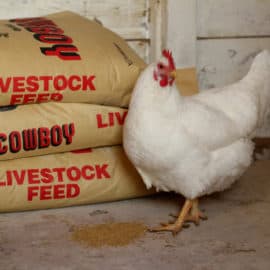
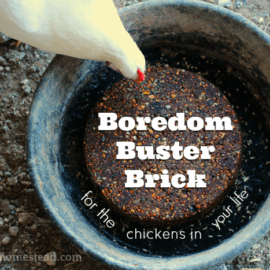
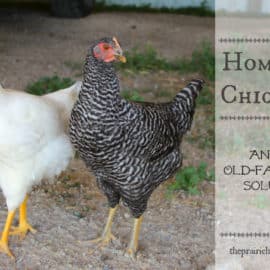
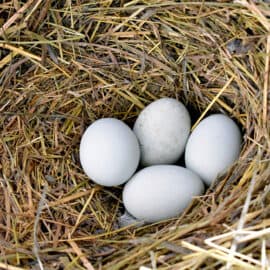
i leave a clear heat lamp light on 24/7 in the winter months. Insulated chicken house and it keeps their water thawed, Red Star hens with mixed roosters makes for a lot of eggs.
I have had the same struggles with choosing to add lighting. Last year we were getting almost NO eggs from a flock of 35. For me, feeding 35 birds all winter and getting no eggs is not an option, so we did add lighting. This year however, we have added no additional lighting and have still been getting 10-15 eggs a day!! Such a blessing. I am so happy I didn’t have to make the “to light, or not to light” call this year!! It’s the little things 🙂
Yes– sometimes mine still lay without light, too. Always a bonus!
Great post Jill! Last winter was our first with chickens, and we had all sorts of issues… which led me to write a post on the lessons we’ve learned and what we’re doing this winter. Check it out if you have a minute! (http://theoldtroddenlane.com/?p=973)
Investstige preserving with waterglass….8tbis not hard..freshh eggs all winter..
This year (for the first time) I am experimenting with a solar LED I bought on Amazon (about $40). It added a bit of light, maybe an hour, in the darkest month and since then it adds about 3 hours. I love that I don’t have to turn it on or off, especially as our coop is on a non-adjacent property. I am getting eggs though not a super abundance, perhaps 12-18 for 4 dozen or so chickens. The feed is so costly that I am happy to get the eggs.
Sounds about normal chickens don’t necessarily lay every day could be every other day. Have had chickens for over 20 years If you need a certain amount of eggs a day, you can always add more chickens to your flock to meet your needs
We are new to this whole thing (animals) but we have decided to do the same thing. Although we look to our chickens for eggs and our goats for milk we don’t plan on doing the things you can do to maximize production. For us it is still all about healthy food. The healthier the animal is then it goes to figure that the food will be healthier as well.
Great post, I agree with thinking about eggs as seasonal. One way we have gotten around this problem is by adding ducks to our homestead. Ducks keep laying all winter when the chickens stop and then stop laying during the summer while the chickens are laying just fine. As far as taste goes there really isn’t much differance between them.
Great idea! I didn’t know that Ducks had different laying requirements than chickens.
We’d have to get a little wading pool for them- we don’t have water at our place.
What type of ducks?
I have used supplemental light for 40 years & never heat with great results. Just switched to a LED they seem to like that even better. I’m lucky to have a 38 year old Hen House timer that even mimics twilight so they can get to their roost. Unfortunately they are not made anymore but you can still buy replacement clock motors.
We also use supplemental lighting. We manage to get eggs all winter, although they do slow down a bit.
I agree with the concept of letting eggs be a ‘seasonal’ food, but like other seasonals. Our flock of all Barred Rock, lay less in the dark winter days, but still lay some, without supplemental light.
As an experiment for next summer’s over-abundance, I did start experimenting with dehydrating eggs. This would let me time-shift the surplus to the ‘lean’ months. I read your blog post from a couple years back where it did not work well for you. Not sure why, but it worked for me.
Mine reconstituted quite well. There was no evident graininess to the texture. I did like a YouTube lady demonstrated, and got a nice fine yellow powder that made acceptable scrambled eggs — on a par with those served in hotel breakfast bars. That’s not a high bar, of course, but preserved-whatever is never usually a good as fresh.
Still, it worked well enough (and certainly for baking needs), that I intend to keep “putting up” pint jars of egg powder during the summer so I can still have scrambled eggs for breakfast next winter.
My point: don’t give up on the dehydrating!
Hmmmm… you just might have convinced me to revisit dehydrating Mic!
I think the hotel sous vide type eggs are the best!!! Try frischs breakfast bar and add the liquid cheese
I am also in Wyoming and I find that even if my hens do lay, and they do, the eggs freeze before I get to them. So not laying is as good as laying for me in the winter.
Yeah– dealing with the same issue here!
What do you do to keep your chickens warm enough when it’s howling and -20F outside? I’m new at this. Thanks, Kani
We didn’t use supplimental light this year. We averaged 2-3 eggs a day. In the past week egg production as started picking back up and we average 6-8 eggs a day. We have built a bucket light and plan on using it on a timer next winter.
Not sure what’s going on in my flock, but our winters have been quite prolific. In fact, I am getting a little stressed right now because I haven’t heard from my egg-buying neighbors for a while and the fridge is overloaded with eggs. I have to go and pick eggs every two hours to keep them from freezing out there. It’s like Easter egg hunt in the winter. I wish I could mail some to those of you who are running short right now 🙂
However, my little ladies decided to quit their jobs last summer for about a month-and-a-half. A big dry zero was laughing at me each time I walked into that dreaded coop. Why was that? My only thought was that we added some youngins that included roosters. The layers might’ve gotten stressed and went on strike.
The egg famine was tough on my family. We just simply could not comprehend those ping-pong balls at the egg section of the grocery store. We went egg-hungry for 1.5 months last summer. I hope this nightmare doesn’t repeat itself.
To answer your question, no lights, no extra winter supplements for my flock. They still free-range and dig into the icy soil for food. And they are finding plenty of things to eat. I give them whole oats, whole wheat, and whole corn in equal amounts to supplement and plenty of water every day all year round. Nothing extra for the winter If their water freezes, they eat snow. They are survivors, you know?
By the way, nice makeover on your site. I like the new awesome look.
Kimberly,
I was a little disturbed by your statements that you do not provide anything extra for your hens during the winter and that if their water freezes, they eat snow – which chickens are not designed to do. You are responsible for the welfare of the animals in your care. They should not be left to “be survivors” but should be provided for appropriately for whatever conditions your environment brings. Where I am from it is a chargable offense not to provide for your animals properly – you are responsible for their survival.
Ryan-Ann – Albera, Canada.
We have superior breeds f livestock protection dogs in the US now (and Canada), because Turkish people treated their dogs like crap, quite literally, making them almost starve and many man many died (like Anatolian shepherd). If you treat one of those dogs too well, feeding a lot of protein when young, you can totally destroy their joints and ruin their health as older dogs. I can thank those people, they have developed something that protects thousands of sheep, goats and cattle each year. Sometimes it is better not to coddle things, everything dies at some point in it’s life. She doesn’t abuse them, she just expects them to do their part. Sad that people give others a hard time with their choices. Coddle your chickens! Then if things get hard, electricity isn’t available to you, etc etc, your chickens will all die. Hers will be prepared. Even human beings can condition themselves to be productive in hard times and it doesn’t involve “abuse”.
I like the idea of giving the chickens a break, but I have to wonder: Do chickens get depressed? Seems silly maybe, but hear me out. Where I live, Seasonal Affective Disorder is VERY common, because by Winter Solstice you don’t see the sun until about 8:30am and by 4:30 it’s setting again. Right now it’s the middle of February and it’s just getting light outside, at 7:40 am. Couple that with some grey days and you have a recipe for misery.
It’s also well-known that an unhappy cow produces far less than a happy cow, right? According to my BIL, whose mom has a dairy farm, it could even be something like getting bored with their food that will make a cow unhappy enough to produce less. Also others have mentioned that stress can cause chickens to refuse to lay entirely.
Could it be that production follows those seasonal patterns partly because the decreased light affects their overall contentedness?
Hmmmm… interesting thought!
I’m going to speculated that a chickens eye has a few similar graces that the human eye does…the suns different colored light will activate different pathways in the body, the less light the less production of the cellular structure of the animal all the way down the line right to egg production, humans are susceptible to lots of maladjustment’s cellularly from lack of properly timed sunlight.
In the begining god created light!…
Thank you for writing on this topic. While I don’t have a problem with eggs being a seasonal food, our winters are so harsh, I do use a light. People have told me it is fine for my birds to be in subzero temps, but I feel bad for them when I see them getting frost bite and have icicles hanging off of their beaks.
Yes– frostbite is something you definitely want to avoid. Thankfully, our climate/coop is dry enough we haven’t had to worry about that, though. 🙂
Hi there,
I wrote an article for Community Chickens Blog (a Mother Earth News activity) about freezing eggs. Here is the link: http://www.communitychickens.com/lets-talk-eggs/
It is a little different from your method but good info I think.
As far as lighting the coop, we use a red lamp to keep temps up (keeps eggs and water from freezing) and provide a bit of extra lighting. We don’t start this until late December to give the girls a bit of a rest which amounts to 1 1/2 to 2 months of seriously decreased egg production. It’s too expensive to feed them and not have a return. We only charge enough to pay for the feed, not to make money.
However, we hope to grow our own grain this year to feed them over the winter and this may encourage us to let them go longer without supplemental light. We may instead provide some supplemental heat to the nesting boxes.
Great post.
Respectfully,
Pam Baker
We do a combination with our chickens. I let them molt in the fall and when most are sporting their new feathers, we begin suplementing light. We also try to have a few new pullets that often begin laying when the older girls are beginning their molt. We end up with a modest quantity of eggs, (enough for our family) through the winter. Our egg customers, have to do without, however. I figure that with the delayed supplemental light, it is as if we are just living a little further south where days are naturally longer.
We live in New Brunswick, Canada and am in zone 4b. It gets quite cold here in the winter and we like to have the light on all the time for the chickens during this time. It helps with egg production and to add a bit of warmth from the bulb for the hens. It is a low wattage bulb with a shroud over it. I have 19 hens and 1 rooster and get 12-16 eggs every day. They are very happy. Also, we grow wheat grass in the house and feed it to the hens. They would rather have that than their grain.
We have had Red Stars and White Leghorns for two years now. Each winter we have started the lights in the fall and stopped them around April. Our girls have moulted fast and furious in the fall and continued to lay all winter. We use rope lights you buy at walmart near the ceiling to diffuse the lighting and keep them out of the way of the birds? These also have no heat and use very little power. They are on a timer that we have increased incrementally since the fall until the birds have 14 hours of light. Because we have heavy snow, the birds often spend 2 months cconfined, we find we have little or no fighting since the lights have been added. We also use a heat lamp on very cold nights( 20-30 below). It has reduced the amount of frost bite the birds suffer. Hope this helps to keep you in yummy eggs thru the winter. Wendy Dunn New Brunswick Canada Eastern seaboard
My hens have light 24/7 with a dark place if they want to get out of the light, I also have clear plastic over their coop which is in my barn that keeps the temp up so their water and eggs never freeze they lay year round except during molt, I would never let them suffer frost bite or cold of any kind to me they are pets the eggs are a bonus but I sell enough to pay for their keep and have enough for my family all winter.
Our chickens aren’t laying because of the cold, do you have any helpful tips? They do have a light, should we leave it on all the time?
Have you tried slaked lime or water glass egg preservation? I hear its really great, and a traditional way to save the summer harvest! Also, canning mayo, pickled eggs too, but you have to need that in order to want to preserve it 😉 Also, from what I’ve read, Chicken have a determinate amount of eggs in their life, so by supplementing light they will end their egg production earlier. We live in the city, and we are limited to 6 birds for a 6 person family. We bake a lot, and eat a lot of eggs. I can cut back on the eating but not the baking. So….we will probably be supplementing their light this winter and make chicken soup a little earlier than we’d like, but until we have acreage that is the life for us.
I have 5 Barred Plymouth Rocks and have had a light (on a timer) for 14 hours all winter. When should I stopping do this so they can molt?
I like your idea that chickens should be able to follow natural cycles and experience days of less light so have a natural rest period. It’s worth noting that chickens originated in the tropics, so the natural rest period for them would not be as much of the year as it would be where I live, in the US. To me, that means it’s probably best to provide some supplemental light but to also respect a natural rest period.
I learned this on accident…hens won’t molt and stop laying their first year. So now I intentionally buy 15 new birds per year so I always have eggs through the winter. But that means I also cull my flock every fall so I don’t have too many birds. I raise chickens for meat too, and raise mostly dual purpose birds for this reason.